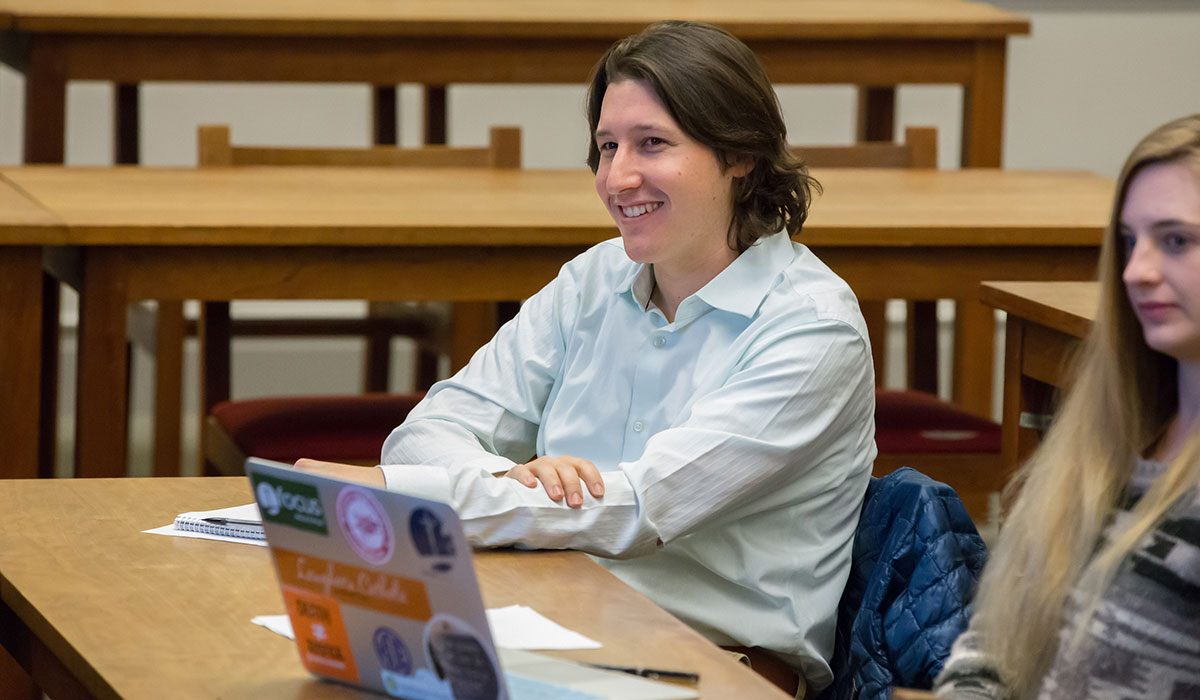The Department of Library and Information Science offers several 300 and 400 level courses for undergraduates. Courses at the 500 and 600 levels are also open to undergraduates at The Catholic University of America, while fulfilling undergraduate degree requirements. (For 500 and 600 level courses, students must obtain the permission of their advisers as well as the chair of Library and Information Science.)
Courses open to all undergraduates include:
-
LSC 322/524: Digital Content Creation and Management
3 Credits
The course covers how individuals and organizations create, communicate, use, and manage digital information content for learning, work, and play. Examples of individual and organizational practices will be drawn from various subject domains (politics, economics, art, history, science, etc.) and from for-profit and non-profit sectors. Students will learn the roles of information technology in digital content creation and management and develop strategies to use information technology effectively and responsibly to benefit individuals, organizations, and society. The roles of social media will be examined in depth. Web applications and mobile technology will be studied for their impact on content creation and management behavior. By examining the interaction between people, information, and technology, the course prepares students to be effective learners, good citizens, and efficient workers in the 21st century. It also introduces them to career opportunities for information professionals in the 21st century. -
LSC 324/524: Actionable Intelligence
3 Credits
Thoughtful analysis of data and information is critical for decision making in many areas of society, including national security, science and technology, medicine, law enforcement, legislation, policy development, business, journalism, academic research, and others. This course provides students with the knowledge and skills to research diverse information sources, assess quality and authenticity of information, and apply intelligence analysis techniques to deliver actionable intelligence for targeted user communities. The course is structured around intelligence community models and practice and emphasizes data and information from a broad range of both traditional resources and evolving digital resources. The course objectives are to develop research skills, analysis abilities, and communication abilities so that students can synthesize data and information and deliver high quality, actionable intelligence to decision makers. Topics covered include: the intelligence cycle (Planning/Direction, Collection, Processing, Analysis and Production, Dissemination), the “all-source collection” concept, evaluating and maintaining information quality, synthesis and analysis of data and information, decision processes, techniques and methods for intelligence analysis, and skills for effective delivery and presentation of research results, including development of briefings. Readings and examples used in class and for assignments are from a variety of contexts, ranging from national security and law enforcement to medicine and business. -
LSC 327: Introduction to Data Science
3 Credits
This is an introduction course to provide foundations in the area of data science with discussion on methods, concepts and opportunities in Data Science. Students will learn foundational data analytics concepts and techniques through recent work and publications as well as projects. Topics of the course include types of datasets, data management and processing, methods for data analysis including machine learning and data mining, data visualization, and issues around data including ethics and policy. The course will combine theoretical foundations with implementation and evaluation of data analysis algorithms on real data. -
LSC 433: Information Retrieval and Analysis
3 Credits
This course is designed for the student who wishes to develop advanced skills in using state-of-the-art information retrieval and analysis tools to locate and deliver information to meet specific information needs. It covers advanced techniques for identification and selection of sources; construction of search strategies; and the evaluation and post-processing of search results. Both open sources, such as web search engines, and commercial fee-based content collections are covered. While text- and document-based retrieval is emphasized, retrieval of images and other forms of information are also explored. The comparison and assessment of content collections and retrieval functionality are also addressed. -
LSC 525: User Interface Design and Evaluation
3 Credits
This course explains how to use design and evaluation techniques to develop successful user interfaces for information systems and other interactive technologies. Students will develop an understanding of the cognitive principles and social issues that affect human-computer interaction. Topics covered include: understanding users and interaction, design strategies, iterative prototyping, formative and summative evaluation, and usability testing. Through a team project, students will apply and refine their knowledge, prototyping and evaluating the design of a user interface for a real-world system. Prerequisite: 555 or instructor's permission. -
LSC 551: Organization of Information
3 Credits (core requirement)
This course introduces students to the basic principles of organizing and representing information for facilitating access based on users' information needs. The course will address how recorded knowledge can be organized and structured, and ways of providing access to the intellectual works. Topics include defining information; describing and indexing intellectual works; current approaches, standards, tools, and systems in use for information organization; and relationship of information organization to information access. -
LSC 553: Information Sources and Services
3 Credits (core requirement)
A solid introduction to the fundamental terminology, concepts, and practices of library public services as well as the skills to deliver them effectively to a variety of information users and within a variety of settings. Special emphasis on the philosophy of reference service, appropriate communications skills for use in instructional settings and reference interviews, standard evaluative criteria for determining fitness of sources to meet information needs, proficient retrieval of information from print and electronic reference sources, policies and procedures for the provision of reference service, and the role of reference and information service departments within an organization. -
LSC 555: Information Systems in Libraries and Information Centers
3 Credits (core requirement)
Introduces students to the evolving role of information systems in the storage and retrieval of information. Students explore how information technology in libraries, archives and information centers, and on the World Wide Web facilitates interaction with information. This course is designed to: Introduce students to applicable theory, principles, and standards; explore the capabilities and functions of several classes of information systems, including established technology like integrated library systems (ILS) and databases as well as evolving social and collaborative environments; introduce essential technology elements (hardware, software, networking, etc.); introduce practical information technology skills used by information professionals, such as working with databases and creating and publishing web pages; and promote critical thinking, problem solving and collaborative teamwork abilities for working with information technology. -
LSC 557: The Information Professions in Society
3 Credits (core requirement)
Introduction to the nature of information, the role of libraries, and the profession of librarianship in contemporary society. Incorporates historical developments, current trends, and the outlook for the future. Emphasizes the values, principles, legal, and ethical responsibilities of the profession and builds a foundation for each student's ongoing professional development and leadership.
The department also offers a new undergraduate minor in information technology as well as a 4+1 Bachelor to Master of Science degree program. Our Visions of Italy course offered as one of our summer institutes is also available to undergraduate students. Follow the links below for more information on these programs.



